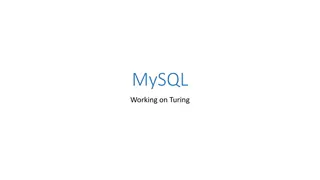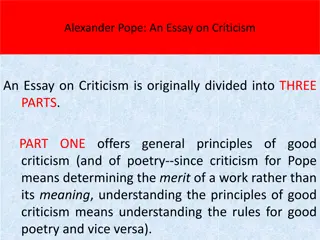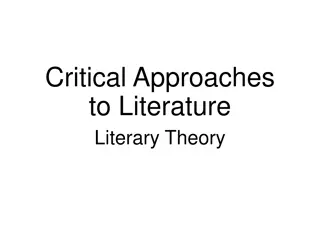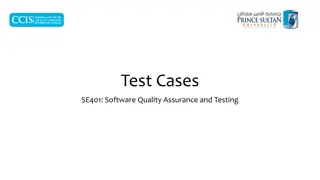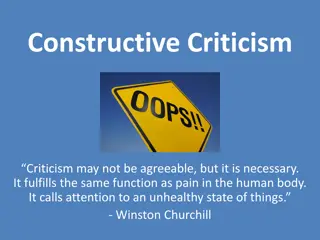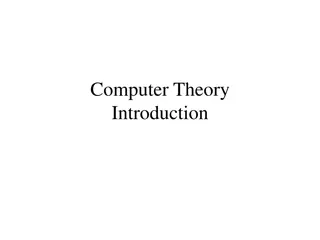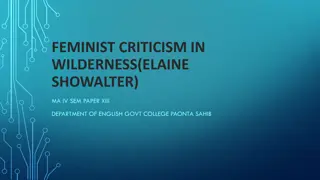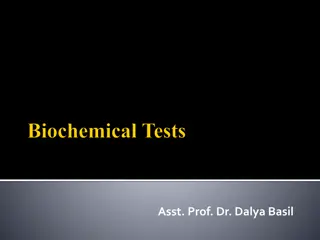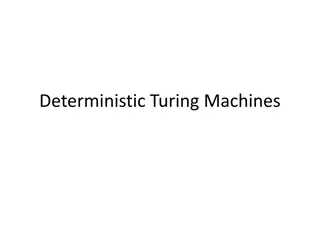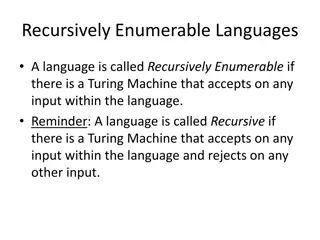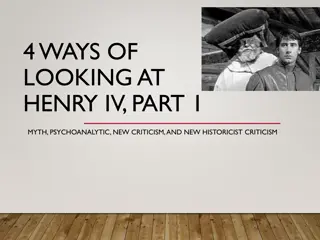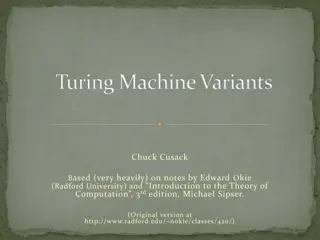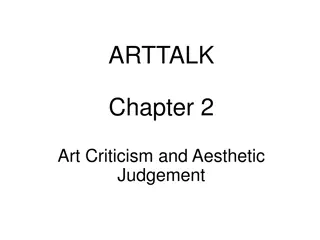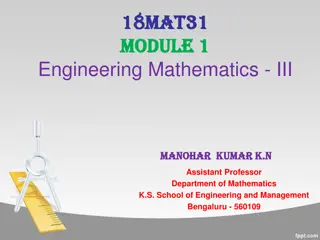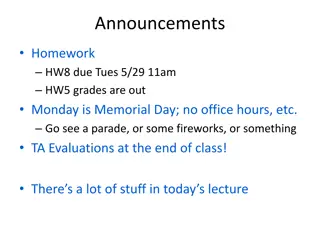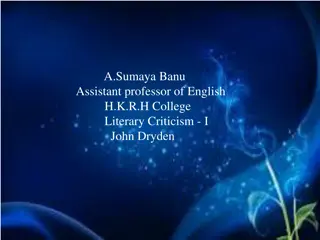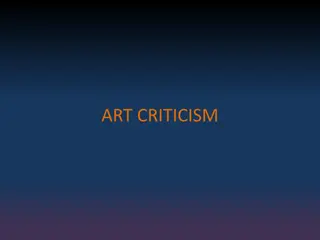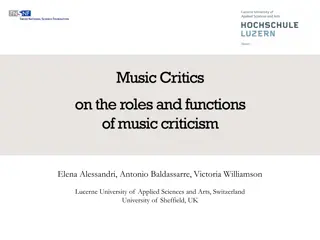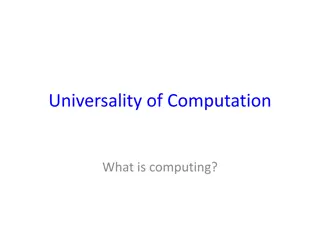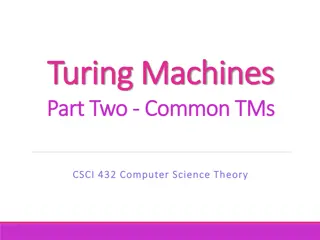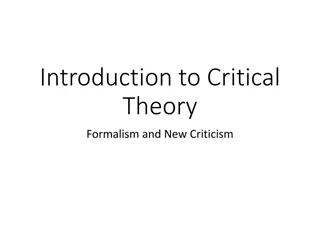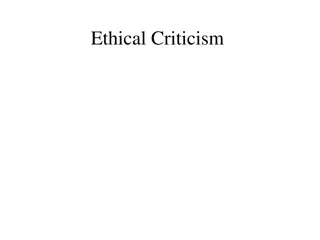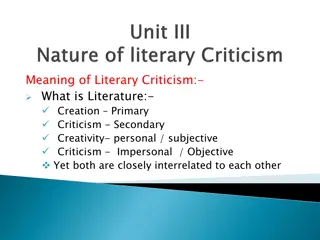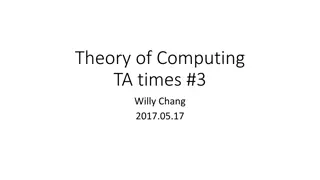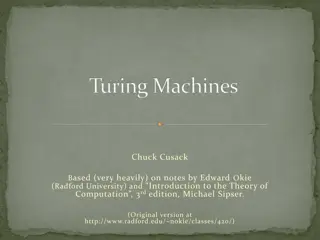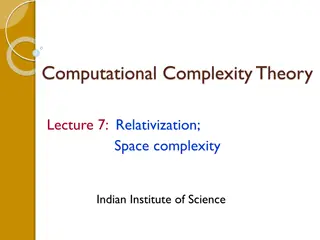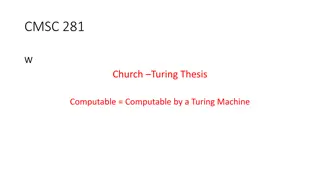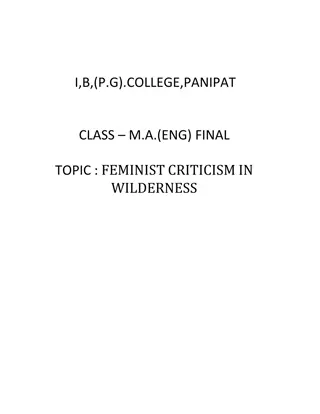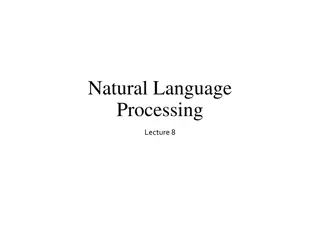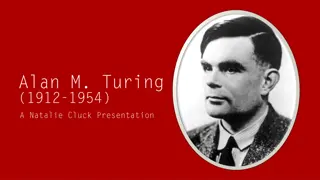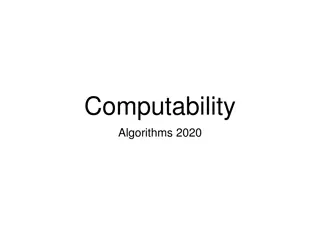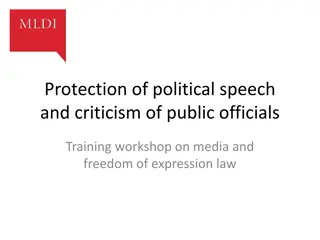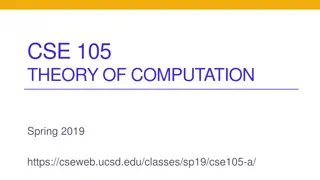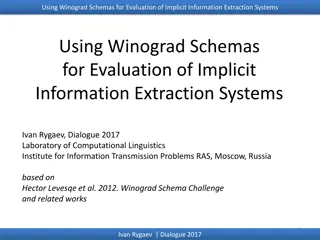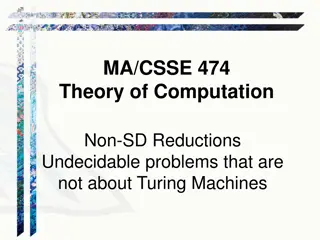Guide to MySQL Operations on Turing Server
This guide provides step-by-step instructions on working with MySQL on Turing server at turing.csce.uark.edu. It includes logging in via SSH, connecting to the server, changing MySQL passwords, and performing operations on tables. Learn how to create tables, change passwords, and more with detailed
2 views • 21 slides
Effective Strategies for Overcoming Test Anxiety
Learn practical methods to combat test anxiety in this 1-hour workshop by CCAMPIS Kayla Taylor. Topics covered include avoiding test anxiety, preparing effectively for tests, identifying and reducing sources of anxiety, quelling anxiety, test-taking strategies, and stress management. The PASS method
0 views • 13 slides
Overview of Alexander Pope's "An Essay on Criticism
Alexander Pope's "An Essay on Criticism" is divided into three parts discussing the principles of good criticism, offering solutions to critical problems, and identifying obstacles to good criticism. Part One delves into the challenges critics face due to partial judgments, false learning, and envy.
0 views • 17 slides
Critical Approaches to Literature and Literary Theory
Explore different critical approaches to studying literature, including Reader-Response Criticism, Formalist Criticism, Psychological/Psychoanalytic Criticism, Sociological Criticism, and more. Dive into questions of how we read, interpret, and perceive meaning in texts, considering the impact of vi
1 views • 20 slides
Understanding Software Testing: Test Cases, Selection, and Execution
Software testing plays a crucial role in identifying and resolving issues within software products. Test cases, selection, and execution are fundamental aspects of the testing process. Test cases define conditions for testing software functionality, with a focus on repeatability and data specificity
2 views • 36 slides
Understanding Literary Criticism: A Comprehensive Overview
Literary criticism involves the study, evaluation, and interpretation of literature, focusing on themes, styles, settings, and historical contexts. This discipline explores the meanings, workings, and values of literary works through interpretation, analysis, and evaluation. Various types of literar
2 views • 20 slides
Understanding Constructive Criticism in College
Constructive criticism plays a vital role in personal growth and development. It distinguishes between constructive and destructive feedback, highlighting the intent behind criticism and its significance in college settings. Embracing feedback positively can enhance one's learning experience and aca
1 views • 13 slides
Understanding Computer Theory: From Automata to Turing Machines
Dive into the world of computer theory, exploring concepts like automata, formal languages, and Turing machines. Learn about pioneers like Alan Turing and the fundamental questions in computer science, from computability to complexity.
1 views • 44 slides
Feminist Criticism in the Wilderness by Elaine Showalter - Analysis
Elaine Showalter's essay "Feminist Criticism in the Wilderness" delves into the realm of feminist literary critique, addressing the diversity among women writers and emphasizing the importance of considering factors beyond gender. Showalter highlights the challenges and goals of feminist criticism w
0 views • 13 slides
Understanding Coagulase Test in Microbiology
The Coagulase test is a crucial microbiological method used to differentiate Staphylococcus aureus (Coagulase Positive) from other Staphylococci (Coagulase Negative). By detecting the presence of the enzyme coagulase, this test helps identify pathogenic strains of Staphylococcus that can cause serio
2 views • 28 slides
Understanding Deterministic Turing Machines
Detailed explanation of Deterministic Turing Machines, their constituents, formal definition, determinism, and special statuses such as Start, Accept, Reject, and Loop. Includes visual representations and key concepts of deterministic Turing machines.
0 views • 14 slides
Understanding Recursive vs Recursively Enumerable Languages
Comparison between recursive and recursively enumerable languages in terms of Turing Machines acceptance, decidable languages, recognizable languages, and partial predicates. Explains the concepts with examples and how Turing Machines decide membership in languages.
0 views • 8 slides
Exploring Different Perspectives on Henry IV, Part 1 Through Myth, Psychoanalytic, New Criticism, and New Historicist Criticism
Delve into various critical lenses such as myth, psychoanalytic, New Criticism, and New Historicist Criticism to analyze Henry IV, Part 1. Uncover the mythic origins of characters like Falstaff, connections to ancient rituals, and the symbolism of killing the king. Discover how literature intertwine
4 views • 26 slides
Turing Machine Variants and Equivalence Theorems Summary
Explore different variants of Turing machines, such as stay-put TMs and multi-tape TMs, along with key results like the equivalence theorems. Understand the idea behind simulating multi-tape TMs with single-tape TMs and how different models are related. Dive into the proofs and implications of these
0 views • 14 slides
Understanding Art Criticism and Aesthetic Judgement
Explore the world of art criticism and aesthetic judgement in Chapter 2 of ARTTALK. Discover the purpose of art criticism, learn to critique art, and understand aesthetic theories. Dive into the realm of professional critics, criteria for judgement, and the importance of forming your own opinions in
0 views • 38 slides
Exploring Engineering Mathematics and Automata Theory Concepts
Delve into topics such as automata theory, Turing machines, and mathematical approaches for addition using unary numbers. Discover state transition diagrams and gain insights into the workings of Turing machines in computer science.
0 views • 23 slides
Exploring Critical Theory Through Literary Criticism and Analogy
Delve into the realm of critical theory through literary criticism, using the analogy of different perspectives on seeing an orange to understand the various facets of analysis like reader response, Marxist/social power, feminist/gender, and psychoanalytic criticism. Discover how critical theory hel
0 views • 9 slides
Sizes of Infinite Sets: Insights into Countably Infinite Concepts
Explore the fascinating world of countably infinite sets through informative images and explanations from a CSE 105 lecture on the Theory of Computability. Delve into the concepts of natural numbers, strings, Turing machines, languages, and the intriguing implications of the Pigeonhole Principle. Di
0 views • 26 slides
Understanding Combinators and Computability: Unveiling the Foundations
Delve into the realm of combinatorial logic and computability through the lens of SKI combinators, exploring their Turing completeness and connection to algorithmic decision-making. Discover the historical significance of Hilbert's program, Godel's incompleteness proofs, the Church-Turing thesis, la
0 views • 65 slides
John Dryden's Literary Criticism and Works
A look into the literary criticism and works of John Dryden, focusing on his formal treatises, advocacy of the heroic couplet, defense of rhymed couplets in tragedy, and discussions on poetry and painting. Dryden's writings encompass a variety of genres and styles, from dramatic criticism to epic po
0 views • 23 slides
Matthew Arnold's Impact on Literary Criticism and Poetry Evaluation
Matthew Arnold, a prominent Victorian poet and critic, revolutionized literary criticism by emphasizing the importance of knowing and promoting the best ideas in the world through critical evaluation. He introduced scientific objectivity to criticism and influenced a generation of critics. Arnold sa
0 views • 25 slides
Understanding Art Criticism: A Comprehensive Guide
Delve into the realm of art criticism to grasp the essence of responding to, interpreting, and making critical judgments about artworks. Explore the steps of art criticism, from description to judgment, and learn how to analyze artworks in terms of elements and principles of art and design.
0 views • 17 slides
Roles and Functions of Music Criticism: Insights from Researchers
Exploring the various aspects of music criticism, this study delves into the role of critics in evaluating music performance, their criteria for assessment, and the impact of their reviews. Researchers interviewed English and German-speaking critics to gain insights into their perspectives and pract
0 views • 20 slides
Overview of Universality and Church-Turing Hypothesis
The universality of computation encompasses physical and mathematically defined computation, along with the concept of Turing machines and universal computers. The Church-Turing Hypothesis posits that everything computable can be computed by a Turing machine. The modern interpretation extends this t
0 views • 27 slides
Understanding Turing Machines and Busy Beaver Problem in Computer Science Theory
Delve into the realm of Turing machines, the Busy Beaver problem, palindromes, and incrementing algorithms. Explore the configurations of a Turing machine tape, the maximum number of 1s a machine can print and still halt, algorithms to determine palindromes, and tape setup for incrementing.
0 views • 10 slides
Understanding Literary Criticism: Formalism and New Criticism
Literary critics analyze and interpret works of literature, delving into social and historical contexts. They focus on techniques, themes, and cross-disciplinary exploration. Formalism, a critical lens, emphasizes internal elements of a text over external influences, seeking universal meanings expre
0 views • 11 slides
Exploring Ethical Criticism and Literature's Human Possibilities
Ethical criticism in literary studies revolves around the intersection of ethics, literature, and criticism. It tackles concerns about the relationship between value judgments, ethics, and aesthetics, emphasizing the importance of reconnecting criticism with moral principles. Literature offers a dee
0 views • 21 slides
Understanding Literary Criticism: Exploring the Art of Interpreting and Evaluating Literature
Literary criticism, rooted in ancient Greek and Roman traditions, involves interpreting, analyzing, and evaluating literary works. It has evolved over time, encompassing various theories and approaches to engage with literature critically. From mimetic theory to analytical criticism, different persp
0 views • 11 slides
Theory of Computing TA Times #3 - Willy Chang
Explore insights on proof by construction, PDA handling, unambiguous grammar, Turing machines, and more in this TA session. Learn how to provide steady examples for proofs, avoid ambiguous grammar structures, and understand the equivalence of Turing machines with reset options.
0 views • 13 slides
Overview of Turing Machines: Introduction, Tape, and Computation
Turing Machines are fundamental in the theory of computation, capable of recognizing all computable languages. They consist of a Finite State Machine combined with an infinite tape. The tape is initialized with input on the left end, and a TM's computation can either halt by entering special accept
0 views • 29 slides
Oracle Turing Machines in Computational Complexity Theory
The lecture delves into the concept of Oracle Turing Machines and their role in proving computational complexity results, such as the limitations of diagonalization in demonstrating P vs. NP. Oracle Turing Machines are defined as Turing Machines with access to a special query tape and states for ora
0 views • 59 slides
Understanding Church-Turing Thesis and Computability with Turing Machines
The Church-Turing Thesis states that every computable function can be computed by a Turing Machine. This concept, pioneered by Turing, revolutionized the way we understand computability and algorithms. By breaking down the process into primitive operations, we can express complex algorithms in an un
0 views • 21 slides
Feminist Criticism in Wilderness: Analyzing Elaine Showalter's Essay
The essay by Elaine Showalter delves into feminist literary criticism, exploring its aims, challenges, and the perception of being in "wilderness." Showalter discusses the evolution of feminist criticism, the need for a solid theoretical framework, and the hurdles faced by feminist critics. She emph
0 views • 14 slides
Understanding Advanced Smoothing Algorithms in Natural Language Processing
Dive into the world of advanced smoothing algorithms like Good-Turing, Kneser-Ney, and Witten-Bell used in Natural Language Processing. Explore concepts such as Good-Turing Smoothing Intuition, Unigram Prior Smoothing, and more general formulations for better language modeling through statistical te
0 views • 21 slides
Alan Turing: Mathematician, Cryptanalyst, and Computer Science Pioneer
Alan Turing, an English mathematician, cryptanalyst, logician, philosopher, and pioneer in computer science, played a crucial role in deciphering German Enigma encrypted messages during World War II. He is known for his work on the Turing machine, considered the foundation of theoretical computer sc
0 views • 6 slides
Exploring Hilbert's Program and Turing Machines in Mathematics
Delve into Hilbert's Program and its impact on the understanding of mathematical truth, from attempts to resolve paradoxes to the concept of formalization of effective procedures. Understand the significance of Godel's incompleteness result in the context of algorithmic decision-making. Explore the
0 views • 40 slides
Protection of Political Speech and Criticism: Ensuring Freedom of Expression for Public Officials
Understanding the importance of freedom of speech in political discourse, this workshop focuses on the legal framework protecting political speech and criticism of public officials. Highlighting the rights and responsibilities in democratic societies, the content emphasizes the necessity of open deb
0 views • 14 slides
Exploring Theory of Computation: Undecidability and Counting Arguments
Dive into the world of theory of computation with a focus on undecidability, counting arguments, and examples of non-Turing recognizable languages. Discover the intricacies of proving problems as undecidable and delve into the concepts of Turing-recognizable sets and deciders for complex computation
0 views • 22 slides
Evaluation of Implicit Information Extraction Using Winograd Schemas
Winograd Schemas are utilized for evaluating implicit information extraction systems. Ivan Rygaev discusses the challenges and significance of this method compared to the Turing Test, emphasizing the need for world knowledge for successful interpretation. The schemas propose unique anaphora resoluti
0 views • 18 slides
Undecidable Problems in Theory of Computation
Explore the concept of undecidable problems in the theory of computation, focusing on non-SD reductions and undecidable problems not involving Turing Machines. Learn about proving languages are not SD, using examples like AanBn and creating reductions to show non-SD properties. Work through reductio
0 views • 31 slides
